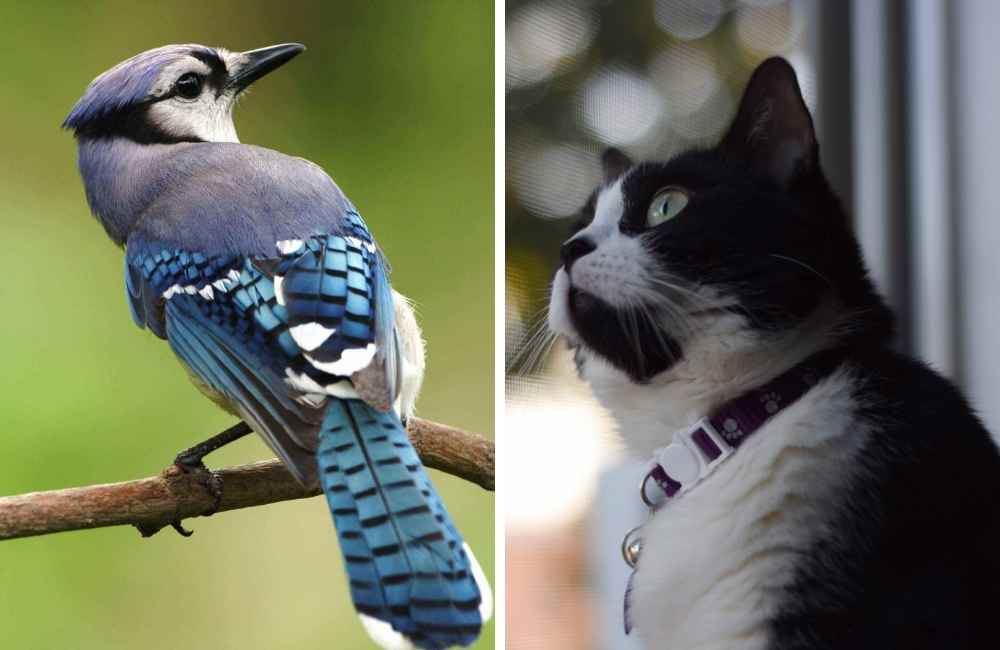Most people know that cats are naturally predatory animals, especially those of us who live with them. Watching our cats stalk, pounce, and swish their tails wildly when they see a prey animal (or when they’re playing with a cat toy) is one of the best parts of cat ownership. Seeing them in their element helps to remind us of their wildcat roots, as well as providing us with some much-needed laughs!
One of the many crazy things our cats do that leaves us scratching our heads is that adorable (yet strange) noise they make when they see birds. It’s technically called chattering (or chittering, depending on who you ask), and every cat owner knows exactly what I’m talking about. If you’ve never experienced it for yourself, it’s sort of like a combination of chirping and meowing in short bursts and at super high speed.
My cats have only ever made this sound when they’re bird watching, which always made me wonder if they were frustrated, excited, or both! While I have had a couple birds “gifted” to me over the years, the majority of them are unreachable, which must be frustrating, right? If you’ve ever wondered if cats get frustrated while watching birds, you’re in the right place! Let’s explore this a little further together.
Do Cats Get Frustrated Watching Birds?
So, what do you think? Do cats get frustrated watching birds they can’t catch, or is it enjoyable to them? The short answer is it really depends on who you ask. While some believe that cats watching birds results in their frustration, others think differently. There are even ways to determine your cat’s mood while bird watching based on body language, so you can investigate for yourself!
The long answer? Keep reading to find out! There are several explanations on the matter that all make sense in their own ways, so since we can’t exactly ask our cat’s opinions (well, I tried but all I got was the stink eye), let’s break this down through the different perspectives and see where we end up, shall we?
Opinion #1: Frustration
The first opinion we’ll discuss is that cats get frustrated while bird watching. It wouldn’t be an unfair conclusion if you think about it, after all they’re predatory animals and it’s in their DNA to hunt prey. Imagine seeing something right in front of you that you’re instinctually attracted to, but you can’t reach it. I’d be frustrated, too!
The common interpretation of a chattering cat is that it’s irritated about something, and it’s usually tied to food or prey. This would explain that funny sound they make that seems to be devoted to the birds!
Something that might help you to figure this out is observing your cat’s body language while she’s busy bird watching. If her eyes are open with slits for pupils, her ears are forward, and she’s got her tail up or it’s vibrating, she’s excited and possibly content.
If she’s swishing her tail back and forth like it could cut through ice, her ears are back, or her pupils are as wide as saucers? You’d be wise to stay out of her way. Those are all signs of a very irritated cat!
Opinion #2: Excitement
The second opinion I’ve found is one that I also personally considered — the excitement of the hunt. Think about it like this: remember when you were a kid, and you saw the ice cream truck driving down your street?
How about when your parents took you to your favorite restaurant for a special dinner? If you’re anything like I was as a child, you squealed and squeaked and made all sorts of strange noises in your excitement, right?
Now think about this from your cat’s perspective. They see something they want, and it’s so close they can almost taste it. It makes sense that they’d get excited as they anticipate sinking their teeth into that juicy bird, doesn’t it?
The bird’s fast movements, sounds, and seeming obliviousness to the cat’s presence are all things that would excite a predatory animal on the hunt! While excitement can easily lead to frustration, it’s not always the case — kitty might be quite content to watch the birds without getting aggravated about it.
Opinion #3: Predatory Instinct
Another interesting way of looking at this debate is to take both of the above opinions off the table and investigate from a scientific perspective. Scientists working with monkeys in the Amazon came across something quite interesting, and entirely by accident: a wildcat mimicking the sounds of the monkeys almost identically.
This led them to a totally different way of thinking about cat chattering: maybe they’re mimicking the birds they watch to gain their trust?
This makes perfect sense if you think about it and is really quite a genius idea on the cat’s behalf. Birds (and most prey animals, really) know better than to get near a cat, which can surely make the cat’s job difficult — expert hunters or not, they can’t fly!
However, if the birds think only other birds are nearby, they can relax and go about their birdie business, totally unaware that they’re being stalked in silence. It’s a great example of nature’s brilliance, when you think about it!
Opinion #4: The Fatal Bite
One other way to translate a cat’s behavior while bird watching is to go back to their instinctive hunting tactics. When cats kill in the wild (or in our back yards, much to our shock and horror), they kill their prey in a very specific way.
In order to sever the spinal cord and kill the prey animal as quickly as possible, they vibrate their jaw when biting the animal’s neck to separate the vertebrae — making the exact same motion they’d make when chattering.
This might explain why they chatter (or chitter) when they see a bird: not frustration or excitement at all, but simple anticipation! Chattering isn’t the only thing that cats do while they’re birdwatching, this is true.
But it would make sense that they’d do it if they were expecting to make a catch, especially when you look at it from the instinctual point of view. Considering the many possible answers for the question at hand, this makes just as much sense as the other opinions here!


